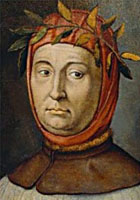Francesco Petrarch Biography
Francesco Petrarca (Italian pronunciation: [franˈtʃesko peˈtrarka]; July 20, 1304 – July 19, 1374), commonly anglicized as Petrarch (/ˈpiːtrɑːrk, ˈpɛtrɑːrk/), was an Italian scholar and poet in Renaissance Italy, and one of the earliest humanists. Petrarch's rediscovery of Cicero's letters is often credited for initiating the 14th-century Renaissance. Petrarch is often called the "Father of Humanism". In the 16th century, Pietro Bembo created the model for the modern Italian language based on Petrarch's works, as well as those of Giovanni Boccaccio, and, to a lesser extent, Dante Alighieri. Petrarch would be later endorsed as a model for Italian style by the Accademia della Crusca. Petrarch's sonnets were admired and imitated throughout Europe during the Renaissance and became a model for lyrical poetry. He is also known for being the first to develop the concept of the "Dark Ages." This standing back from his time was possible because he straddled two worlds - the classical and his own modern day.
I go weeping for my time past,
that I spent in loving something mortal,
without lifting myself in flight, for I had wings
...
Diana was never more pleasing to her lover,
when, by a stroke of fate, he saw her naked,
shown in the deep pool of icy water,
than I was by the mountain shepherdess,
...
I have not seen you, lady,
leave off your veil in sun or shadow,
since you knew that great desire in myself
...
Being one day at my window all alone,
So manie strange things happened me to see,
As much as it grieveth me to thinke thereon.
At my right hand a hynde appear'd to mee,
...
I find no peace, and yet I make no war:
and fear, and hope: and burn, and I am ice:
and fly above the sky, and fall to earth,
...
